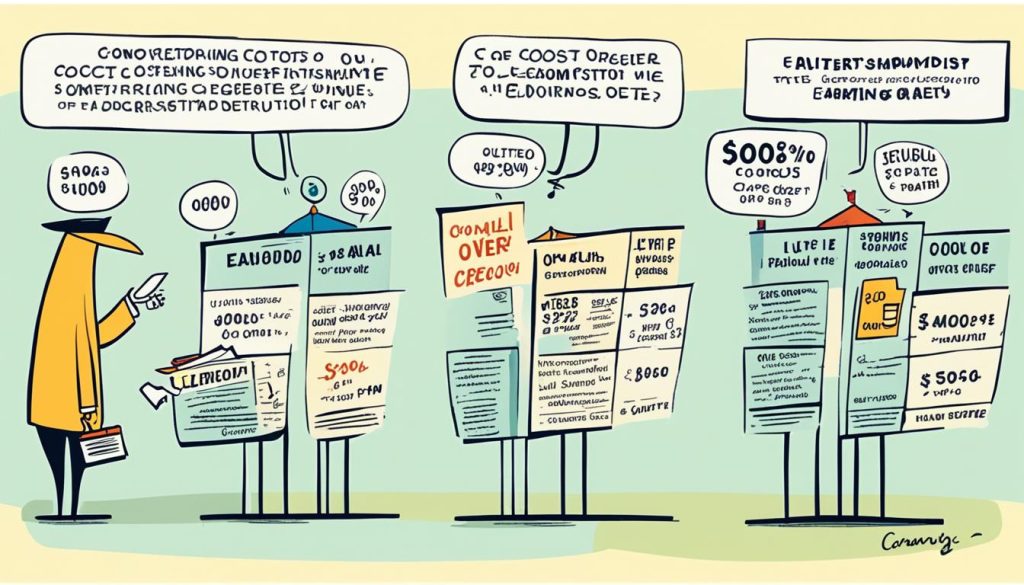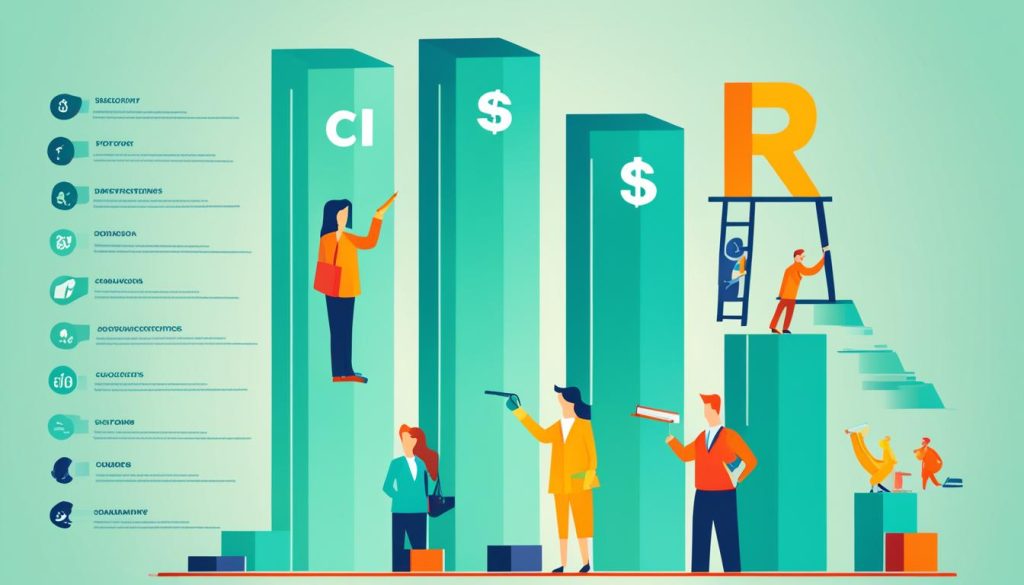Thinking about higher education? Look past the costs and see the long-term benefits a degree or certification brings. Scott Pulsipher, President of Western Governors University, says a college education’s true value is in the doors it opens and the social and economic mobility it offers1.
A recent report from Georgetown University’s Center on Education and the Workforce shows Alfred State College students get a great return on their investment. They rank #1 in Western New York for earnings in the first ten years after graduation1.
It’s time to change how we view higher education. Let’s focus on what students need to make sure their investment pays off1.
Key Takeaways
- The true value of a college degree goes beyond just the cost, but the opportunities it can unlock for career advancement and social mobility.
- Certain colleges, like Alfred State, are providing students with a high return on their educational investment, earning more in the first 10 years of their careers compared to the cost.
- Shifting the focus to put students at the center of higher education planning can help ensure your investment yields tangible, measurable value.
- Evaluating the return on investment (ROI) of degrees and certifications is crucial when considering the long-term benefits of pursuing higher education.
- Upskilling through certifications can be a cost-effective alternative to traditional degree programs, providing valuable skills and knowledge.
The Value of Higher Education: Unlocking Opportunities
Higher education is seen as a key to career success and financial security. Studies show that college graduates often earn more and have better job options than those without a degree2. Since 1960, more Americans have gotten a bachelor’s degree, showing how vital college has become2.
Career Prospects with Degrees and Certifications
Having a college degree can lead to higher-paying jobs and specialized skills needed in today’s high-demand fields2. Yet, many graduates find themselves in jobs that don’t really need a degree2. This shows the importance of choosing the right field and considering professional certifications.
Skilled Labor Demand: The Need for Specialized Knowledge
Today’s workforce wants workers with specific skills and knowledge due to fast tech changes and job market shifts3. Companies value college-educated workers more, with more jobs now open to those without a degree2. This change highlights the need for ongoing learning and certifications to stand out in the job market.
Choosing to go to college is a big decision with many factors to think about. While a degree can lead to higher earnings over a lifetime3, the ROI can differ a lot based on your field and personal traits3. Yet, college offers more than just financial benefits. It also helps with personal growth, staying adaptable, and learning key skills for today’s jobs4.
“College education cultivates adaptability, broad knowledge, discipline, and exposure to conflicting viewpoints, elements expected to be increasingly valuable for Generation Alpha’s job market.”4
The job market is always changing, making specialized knowledge and adaptability more important. By investing in higher education and certifications, people can improve their career chances and open up more opportunities.
Calculating the Return on Investment (ROI) of Education
Looking into the value of higher education, the return on investment (ROI) is key. A detailed study from the Georgetown University’s Center on Education and the Workforce5 shows the economic perks of getting a degree or certification.
Economic Benefits of Education: Earning Potential and Social Mobility
The study shows a bachelor’s degree has a lifetime ROI of 287.7%5. But, the first 10 years show a negative ROI of -41.1%5. It takes 15 years of full-time work for bachelor’s degree holders to see positive returns5.
An associate’s degree has a lifetime ROI of 1,200.8% and a 20-year ROI of 363.5%5. Master’s degree holders see a lifetime ROI of 433.5% and a 20-year ROI of 90.1%5. Doctoral and professional degrees also offer significant ROIs of 416.3% and 350.1%, respectively5.
These numbers show the big economic gains from higher education, like better pay and moving up in society5. For example, a bachelor’s degree can increase earnings by 39.0% compared to an associate’s degree5. Moving from a bachelor’s to a master’s degree can lead to a 38.8% annual wage boost5.
Some fields, like computer and information sciences, have a lifetime ROI of 716.6% for bachelor’s degree holders5. Others, like commercial art or graphic design, see a 6.3% ROI over 20 years5. Even in agriculture, the ROI for degrees can hit 117.5% over 40 years5.
These results highlight the big economic benefits of investing in higher education. They show the potential for big earnings and moving up in society5. By knowing the ROI of different degrees and certifications, students can choose wisely and get the most out of their education5.
Is It Worth Investing in Education? The ROI of Degrees and Certifications
Is higher education worth the investment? The answer is yes, thanks to solid data. Earning a degree or certification opens doors to better careers and financial gains.
A recent report shows the median return on a bachelor’s degree is $160,0006. Certain fields like engineering and computer science can bring in $500,000 or more6. Also, those with a bachelor’s degree face a 2.2% unemployment rate, lower than high school graduates at 4%6.
Education offers more than just higher pay. The Georgetown University study found that some high school and associate degree holders earn more than many with a bachelor’s degree7. This shows the value of specialized knowledge and skills gained through education.
It’s not just about four-year degrees. Undergraduate certificates in technical trades often pay off better than a bachelor’s degree6. While some master’s programs may not be worth it, fields like law and medicine are very lucrative6.
The data clearly shows that investing in education is smart. It leads to better jobs, more money, and social mobility. So, think about getting a degree, certification, or specialized training to boost your future.
Weighing Educational Costs: Upfront Investment vs. Long-Term Gains
The cost of education can be a big worry for students and families. But, recent studies show that investing in higher education pays off in the long run. The Georgetown University report found that a bachelor’s degree and an associate’s degree have about a 15 percent economic return over the last decade8.
Those with a bachelor’s degree earn 56 percent more than high school graduates. Associate’s degree holders earn 21 percent more8. Workers with a bachelor’s degree make about $64,500 a year, while high school graduates earn around $41,0008.
For those looking for a cheaper option, professional certifications can be a good choice. Pursuing industry-specific certifications can boost your job prospects and meet what employers want, as shown in the second link9. These certifications focus on specific skills and knowledge, offering a good return without the high cost of a degree.
Upskilling Through Certifications: A Cost-Effective Alternative
Getting a Master’s degree often means earning more money, showing it’s a good investment9. People with advanced degrees are more likely to get leadership roles, needing a Master’s for senior and executive positions9. Higher education can lead to better salary offers because of the specialized skills and knowledge you gain9.
But, the cost of higher education, like tuition and living expenses, is a big factor9. You also need to think about the earnings you miss out on while studying9. Certifications offer a way to improve your career without spending a lot.
The balance between upfront costs and long-term benefits is key for students and families8. By looking at the costs and benefits of different education options, you can make choices that fit your career and financial goals8910.
Conclusion: Maximizing Your Educational Investment
This article shows the big value and great return on investing in higher education, especially at Alfred State. It opens doors to many career chances and the need for special skills. It also shows how education boosts your earnings and moves you up in society. This makes education a smart and life-changing choice.11
Think about the costs and benefits of your education. Look into professional certifications and online learning to get the most from your education. With smart money planning, part-time jobs, and balancing school, you can find a fulfilling career and a stable future.12
Education changes lives, whether it’s a full degree, a special certification, or starting your own business with self-learning. By taking advantage of what education offers, you can open new doors, gain needed skills, and set yourself up for a bright future.1112
FAQ
Is investing in education worth it?
What are the economic benefits of education?
FAQ
Is investing in education worth it?
Yes, investing in higher education, like an Alfred State education, is a smart choice. It offers a big return on investment. Graduates see higher earnings and better career chances, making their degrees valuable.
What are the economic benefits of education?
An Alfred State education is a wise investment, with a 6,000 Net Present Value (NPV) in ten years. Over 40 years, the NPV jumps to
FAQ
Is investing in education worth it?
Yes, investing in higher education, like an Alfred State education, is a smart choice. It offers a big return on investment. Graduates see higher earnings and better career chances, making their degrees valuable.
What are the economic benefits of education?
An Alfred State education is a wise investment, with a $206,000 Net Present Value (NPV) in ten years. Over 40 years, the NPV jumps to $1,111,000. This shows the economic perks of education, like higher earnings and better social standing.
How does the demand for specialized skills affect the value of education?
The Georgetown University study shows a big need for specialized skills in the job market. Degrees and certifications lead to better jobs and prepare people for in-demand fields. They give the skills and knowledge needed to succeed.
What are the cost-effective alternatives to traditional degrees?
For those wanting to save money, professional certifications are a good choice. They offer a way to gain new skills and move up in your career. Certifications are less expensive than degrees but still provide a strong return on investment.
How can individuals maximize their return on educational investment?
By looking at both the costs and the long-term benefits, people can make the most of their education. Exploring options like professional certifications can also help. This way, individuals can set themselves up for success in the long run.
,111,000. This shows the economic perks of education, like higher earnings and better social standing.
How does the demand for specialized skills affect the value of education?
The Georgetown University study shows a big need for specialized skills in the job market. Degrees and certifications lead to better jobs and prepare people for in-demand fields. They give the skills and knowledge needed to succeed.
What are the cost-effective alternatives to traditional degrees?
For those wanting to save money, professional certifications are a good choice. They offer a way to gain new skills and move up in your career. Certifications are less expensive than degrees but still provide a strong return on investment.
How can individuals maximize their return on educational investment?
By looking at both the costs and the long-term benefits, people can make the most of their education. Exploring options like professional certifications can also help. This way, individuals can set themselves up for success in the long run.
How does the demand for specialized skills affect the value of education?
What are the cost-effective alternatives to traditional degrees?
How can individuals maximize their return on educational investment?
Source Links
- Use of Phillips’s five level training evaluation and ROI framework in the U.S. nonprofit sector.
- Why ROI Matters
- Is College Only A Good Investment For The Best Students?
- Why college is worth it | Investing in college | Fidelity
- Is College Worth it? | Return on Investment Analysis of College Degree
- Does College Pay Off? A Comprehensive Return On Investment Analysis
- Is College Worth It? Consider These Factors Before Enrolling
- Do the Benefits of College Still Outweigh the Costs?
- Is a Master’s Degree Worth the Investment? Here’s What You Need to Know
- The value of a college education
- Investing in Education: A Smart Financial Decision – Rizwan Ahmed CPA Grant
- Loanch | Benefits of Investing in Education: A Path to Better Earnings and Savings



